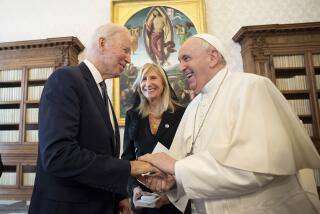Clergy and Laity Part Ways on War
- Share via
A theological split between clergy and laity on the matter of the Iraq war is hardly surprising in a land in which the laity are besotted by guns, gargantuan vehicles, violent entertainments and insatiable acquisition (“Parting Souls,” by Joel Kotkin and Karen Speicher, Opinion, May 11). The message of the Gospel was stunning to the populace who heard it first. So stunning that it led directly to the execution of Jesus, who preached it. Jesus’ message violated the ethos of the Roman Empire in his day just as it violates the ethos of the U.S. today.
That there are clergy whose spiritual imaginations are not limited to conceiving a God created in man’s image is to be celebrated and given thanks for. That much of the laity can comprehend a God no more evolved than the National Rifle Assn. devotee next door is to be deeply lamented. Jesus said the Gospel path was a narrow one and that few would wish to follow it. We have only to look at the pro-war flags flapping atop the rooftops of the vehicles of allegedly “Christian” America to see how few here have chosen it.
Laurel Hall
La Habra
*
Would we really want to live in a culture where priests, rabbis and other religious leaders encouraged war?
Gary McAuley
Templeton
*
The Opinion piece about a schism between laity and clergy frames itself as an objective article citing lots of statistics. Yet the reasons why it’s in the Opinion section bleed through. Kotkin and Speicher characterize the pro-war laity monolithically, as being firmly in support of the Iraq war. While many Americans clearly fit this description, others are troubled by the dichotomy of praying to the Prince of Peace even as they cheer for the dropping of bombs.
When the writers’ source who is critical of the pro-war stance refers to xenophobia, they immediately reframe it as patriotism. On the other hand, the writers portray pro-peace clergy as elitist and out of touch. No pejoratives are applied to their pro-war congregants. Finally, the writers conclude with ominous rumblings about disturbing fragmentation among the faithful. For those who want everyone marching to the same drummer, yes, perhaps democracy is disturbing.
Brian Nelson
Woodland Hills


